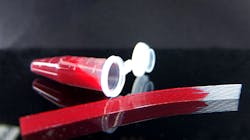'Lab on a stick' test optically and rapidly detects antibiotic resistance
A team of researchers from Loughborough University and the University of Reading (both in England) has developed a point-of-care test for rapid detection of bacterial resistance to antibiotics in urine. The low-cost, simple Lab-on-a-Stick device couples microfluidics and a transparent microcapillary film with optical properties suitable for naked eye detection or measurement with portable, inexpensive equipment such as a smartphone camera.
The test, which the researchers claim is at least 12 times faster than current microbiological tests, is based on dipstick tests routinely used for pregnancy tests and soil pH testing. But their test improves upon the dipstick method, as it includes a microfluidic strip that comprises tiny test tubes about the size of a human hair made from a low-cost, microengineered transparent plastic film material to enable 10 different concentrations of antibiotic per sample to be tested with a single strip.
While many researchers have already shown how miniaturizing lab tests can speed them up using microfluidic lab-on-a-chip devices, they are too expensive to be useful outside the laboratory, explains Dr. Al Edwards, Associate Professor in Biomedical Technology at the University of Reading. "What we have done is to develop a low-cost way of making thousands of miniature test tubes so that we can use them for many important applications," he says.
Full details of the work appear in the journal Lab on a Chip; for more information, please visit http://dx.doi.org/10.1039/c6lc00332j.
